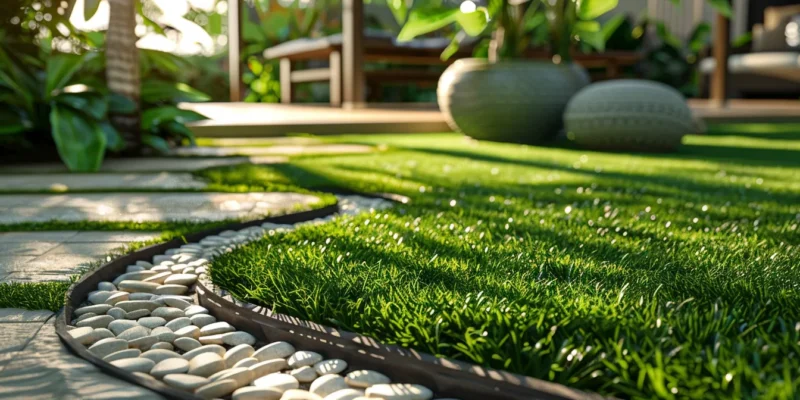In recent years, artificial grass has gained popularity due to its low maintenance and versatility , can artificial grass cause cancer. However, it has also been the subject of debate, particularly regarding concerns that some of its components may be linked to cancer. In this article, we’ll break down the arguments, studies, and data to answer this important question, concluding that, based on current scientific evidence, there is no conclusive proof that artificial grass causes cancer.
What is Artificial Grass, and Why the Concern?
Artificial grass consists of synthetic fibers designed to mimic the look and feel of natural grass. These fibers are typically backed by infill, which may include silica sand or crumb rubber. The latter is derived from shredded tires and contains various chemical compounds, raising concerns about potential health risks.
The main concern is that crumb rubber infill could release volatile organic compounds (VOCs) and other chemicals that may have carcinogenic effects. However, the science behind these claims is not always definitive. While it’s natural for people to wonder about the risks, it’s crucial to analyze the data before jumping to conclusions.
The Main Components of Artificial Grass: Are They Safe?
Artificial grass is primarily made of polyethylene, polypropylene, and other inert polymers. These materials are considered safe on their own. However, crumb rubber infill draws the most scrutiny because it contains traces of polycyclic aromatic hydrocarbons (PAHs), heavy metals, and other chemical compounds.
These elements can be released under certain conditions, such as high temperatures. Nevertheless, studies have shown that human exposure to these chemicals during normal use of artificial grass is minimal and does not reach levels that pose a real health risk. Regulatory agencies have also extensively investigated these materials and found no solid evidence of direct danger.
What Does the Science Say About Artificial Grass and Cancer?
Several scientific studies have explored the potential connection between artificial grass and cancer, focusing particularly on crumb rubber infill. According to research reviewed by organizations like the Environmental Protection Agency (EPA) and the National Institute of Environmental Health Sciences (NIEHS), there is no conclusive evidence that artificial grass directly causes cancer.
One commonly cited example involves athletes who developed cancer after playing on artificial turf fields. While these stories are impactful, studies have not been able to establish a clear causal link between artificial grass use and these diagnoses. Many experts agree that factors such as genetic predisposition, lifestyle, and exposure to chemicals in other contexts may play a significant role.
Myths and Realities About Crumb Rubber Infill
One of the main myths is that crumb rubber is inherently dangerous. In reality, this material has been widely used in pavements and sports surfaces without consistent evidence of adverse effects. Although it contains chemical compounds, the amount released under normal conditions is minimal and generally not considered a significant risk.
There are also alternatives to crumb rubber infill, such as sand or cork, which eliminate these concerns altogether. Therefore, those looking for eco-friendly or chemical-free options can choose these alternatives without compromising the functionality of artificial grass.
Relevant Studies and Findings to Date
Numerous international studies have evaluated the potential toxicity of artificial grass. An analysis conducted by the Agency for Toxic Substances and Disease Registry (ATSDR) concluded that exposure levels to chemicals on artificial turf fields were extremely low and within safe limits.
Similarly, independent research in Europe and the United States has reached comparable conclusions. While some studies have identified potentially hazardous compounds, their concentrations are so low that they are not considered sufficient to cause significant harm to human health.
Proven Benefits of Artificial Grass for Health and the Environment
Despite the concerns, artificial grass offers clear advantages:
- Water conservation: It does not require constant watering like natural grass.
- Reduced need for pesticides and fertilizers: These chemicals, commonly used on natural grass, can be harmful to health and the environment.
- Durability and low maintenance: It reduces costs and time spent on lawn care.
Additionally, artificial grass provides safe and uniform surfaces for sports activities, minimizing injury risks and encouraging active lifestyles.
What Precautions Should You Take When Using Artificial Grass?
Although there is no conclusive evidence that artificial grass causes cancer, it is reasonable to take some precautions:
- Ensure proper ventilation: This helps disperse potential emissions of chemical compounds.
- Avoid prolonged contact during high temperatures: If the grass is hot, limit usage time.
- Opt for safe alternatives: If concerned about crumb rubber, consider options like sand or organic materials.
Conclusion: Does Artificial Grass Pose a Health Risk?
Based on current scientific evidence, artificial grass cannot be definitively linked to cancer. While it contains certain chemicals, typical exposure concentrations are too low to pose significant risks.
It is essential that discussions on this topic rely on solid data rather than assumptions or isolated cases. While it is understandable to be cautious, we must also recognize the benefits artificial grass provides, especially when proper precautions are taken.
Ultimately, artificial grass remains a safe, practical, and sustainable option for various uses, from recreational areas to sports fields. With continued research and technological advancements, its safety and functionality will continue to improve over time.

